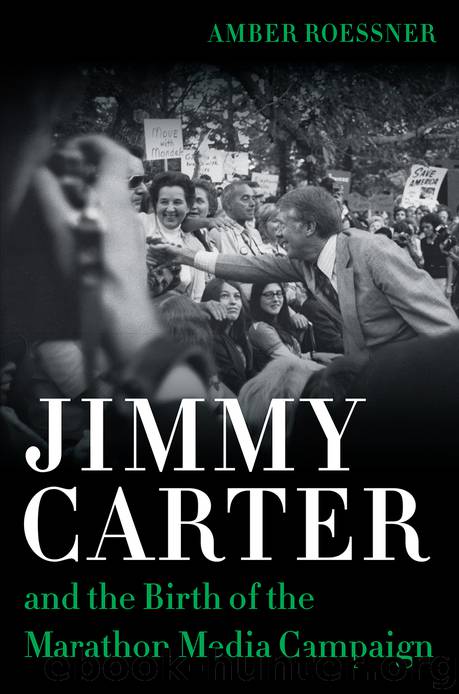Jimmy Carter and the Birth of the Marathon Media Campaign by Amber Roessner

Author:Amber Roessner
Language: eng
Format: epub
Publisher: LSU Press
Published: 2020-05-24T16:00:00+00:00
Frontline reporters situated at mainstream outlets, yearning to avoid accusations of bias, pursued audiences with a detached brand of horse race analysis, but as the candidates entered the “homestretch,” they embraced a more critical mode to voice final thoughts on the 1976 race. Despite diverse backgrounds, the consensus-minded pack settled on a general reproach of the “barren and petty” system of showbiz politics that echoed media criticism uttered since midcentury.101 New York Times veteran political reporter R. W. Apple Jr., for instance, rebuked both candidates for colluding with campaign staffs to slickly “sell themselves as men worthy of trust” and engaging in underhanded attacks. But he did not overlook the pack’s complicity, censuring them for their part in contributing to the emerging cultural malaise over trivial campaign coverage. “It is not possible to say whether the news media or the candidates themselves have had the most to do with the creation and perpetuation of these controversies, but both have certainly contributed, the candidates reaching for headlines and television time, the reporters seeking to enliven a pallid campaign.”102
Pundits, such as Tory-leaning columnist George Will, echoed the consensus-minded pack’s condemnation of the “grotesque campaign process” involved in the new age of showbiz politics. Within the system, staffs “moved heaven and earth to get forty seconds of television film” of their media pseudo-events, and reporters tried “to satisfy the public’s sad superstition that the conduct of personal affairs can be televised and thereby made somehow accessible to all.”103 The bicentennial campaign devolved into the “most trivialized campaign in several generations,” he contended, and all parties were to blame for the lack of commitment to the public interest and the loss of “a community of shared values.”104
Will and his like-minded colleagues grappling with the “disease of American politics” echoed critiques cultural commentators had voiced since midcentury.105 Critics only diverged in the shrillness of attacks against opposition forces. In formulating their assault, they collectively constructed a golden age of American politics, an environment free from artifice with candidates committed to the public interest debating about substantive issues affecting various interest groups, and they bemoaned in unison the loss of a sacred community with shared political values. In reality, this idyllic political milieu never existed. Post-1968 reforms stripped substantial power from traditional political elite and allowed more individuals to have a voice in the party nomination and electoral processes, but in the end, many individuals remained undecided and disillusioned based on their exposure to reformed showbiz politics.
The political cynicism and apathy many Americans experienced manifested themselves in data collected by polling experts, in subsequent news reports, and in letters to the editor of U.S. newspapers. The New York Times published new findings released by the Committee for the Study of the American Electorate, which revealed that “for the first time in 50 years, a majority of eligible voters may not cast ballots,” and pundits speculated over whether apathy would be “the landslide winner in the election.”106 CBS News correspondent Roger Mudd indicated that this might be
Download
This site does not store any files on its server. We only index and link to content provided by other sites. Please contact the content providers to delete copyright contents if any and email us, we'll remove relevant links or contents immediately.
The Secret History by Donna Tartt(19088)
The Social Justice Warrior Handbook by Lisa De Pasquale(12190)
Thirteen Reasons Why by Jay Asher(8910)
This Is How You Lose Her by Junot Diaz(6887)
Weapons of Math Destruction by Cathy O'Neil(6280)
Zero to One by Peter Thiel(5802)
Beartown by Fredrik Backman(5754)
The Myth of the Strong Leader by Archie Brown(5507)
The Fire Next Time by James Baldwin(5446)
How Democracies Die by Steven Levitsky & Daniel Ziblatt(5219)
Promise Me, Dad by Joe Biden(5153)
Stone's Rules by Roger Stone(5088)
A Higher Loyalty: Truth, Lies, and Leadership by James Comey(4964)
100 Deadly Skills by Clint Emerson(4925)
Rise and Kill First by Ronen Bergman(4789)
Secrecy World by Jake Bernstein(4753)
The David Icke Guide to the Global Conspiracy (and how to end it) by David Icke(4720)
The Farm by Tom Rob Smith(4512)
The Doomsday Machine by Daniel Ellsberg(4490)
